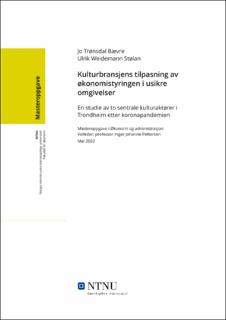Kulturbransjens tilpasning av økonomistyringen i usikre omgivelser
Master thesis
Permanent lenke
https://hdl.handle.net/11250/3018618Utgivelsesdato
2022Metadata
Vis full innførselSamlinger
- NTNU Handelshøyskolen [1623]
Sammendrag
Denne masteroppgaven er en flercasestudie som tar for seg to organisasjoner som opererer i kultursektoren i Trondheim, Trondheim Symfoniorkester & Opera (TSO) og Byscenen Drift AS (Byscenen). Formålet med studien har vært å få innsikt i hvordan økonomistyringssystemet har blitt brukt og hvilke styringspraksiser som har dominert i disse organisasjonene, for å møte den usikkerheten og krisenivået som koronapandemien førte med seg. Kultursektoren har tidvis vært nedstengt, og ellers hatt et betydelig begrenset handlingsrom under pandemien.
Myndighetenes støtteordninger har hatt stor betydning for organisasjonenes tilpasning av økonomistyringen, og er dermed en sentral del av oppgaven. Forskning innen betingelsesteori har en rekke funn som sier noe om hva som er good fit mellom styringsmekanismer og kontekst, hvor denne studien kan bidra med innsikt. Det kan imidlertid virke som at krisenivået i sektoren har vært mindre dramatisk enn antatt, hovedsakelig på grunn av støtte fra det offentlige. Med bakgrunn i ovennevnte har vi benyttet følgende problemstilling:
Hvordan tilpasser kulturaktører økonomistyringen i usikre omgivelser?
For å besvare problemstillingen har vi foretatt en kvalitativ studie. Vi har foretatt dokumentstudier av retningslinjer og tiltakspakker fra myndighetene for å forstå rammebetingelsene i sektoren, samt regnskapsdata tilhørende organisasjonene for økonomisk innsikt. I tillegg har vi foretatt dybdeintervjuer med organisasjonene om deres styringssystem. Styringsmekanismene har blitt studert ved hjelp av Hopwood (1974), Malmi og Brown (2008) og Simons (1995) sine teoretiske rammeverk, samt institusjonell teori (DiMaggio & Powell, 1983). Endringer i rammevilkår blir belyst ved hjelp av og betingelsesteori (Chenhall, 2003).
Vi har delt funnene i oppgaven inn i fem hovedfunn som sier noe om organisasjonenes tilpasning i løpet av snaut to år med pandemi. Det første funnet er at offentlig støtte har dempet effekten av pandemien, noe som i utgangspunktet reduserer behovet for tilpasning av økonomistyringen. I tillegg har organisasjonene i studien et sterkt felles verdi- og normsett som har gjort organisasjonene robuste og motstandsdyktige mot endringer og usikre tider. Dessuten har aktørene benyttet seg av kortsiktig planlegging og kybernetisk styring for å sikre seg mot usikre omgivelser. Videre er organisasjonene aktive i organisatoriske felt, og ved hjelp av samarbeid innad i disse, har de redusert effekten av usikkerhet. Det femte og siste funnet er at organisasjonenes teknologi, eller produksjonsprosess, samt organisasjonsstruktur og størrelse gir ulike forutsetninger for hvordan organisasjonene tilpasser seg, noe som har gjort tilpasningen ulik på noen områder. This master's thesis is a multi-case study that studies two organizations operating in the performing arts sector in Trondheim, Trondheim Symfoniorkester & Opera (TSO) and Byscenen Drift AS (Byscenen). The purpose of the study has been to gain insight into how the management control system has been used, and which management control practices have dominated, in these organizations to meet the uncertainty and crisis level that the corona pandemic brought with it. The performing arts sector has occasionally been under a lockdown, and otherwise had limited leeway for organizational activity. The financial support from Norwegian authorities have been of great importance for the organizations' use of the management control system and are thus a central part of the task. Earlier research in contingency theory has several findings that say something about what is a good fit between controls and context, where this study can contribute with insight. However, it may seem that the level of crisis in the sector has been less dramatic than expected, mainly due to the support from the authorities. Based on the above, we have used the following research question:
How do organizations in the performing arts sector adapt their management control system in uncertain environments?
To answer the question above, we have conducted a qualitative study. We have conducted document studies of the fiscal support and guidelines from the authorities to understand the conditions in the sector, as well as accounting data belonging to the organizations. In addition, we conducted in-depth interviews with the organizations about their management control system. Management controls have been studied using Hopwood's (1974), Malmi and Brown's (2008) and Simons’ (1995) theoretical frameworks on organizational management control packages, as well as institutional theory (DiMaggio & Powell, 1983). Changes in external conditions are discussed by means of contingency theory (Chenhall, 2003).
We have divided the findings in the thesis into five main findings that say something about the organizations' adaptation during just under two years of pandemic. The first finding is that support from the authorities has mitigated the effects of the pandemic, which in principle reduces the need for adaptation of management control. We also found that the organizations have a strong common set of values and norms that have made them resistant to unsafe environments. The organizations increased action planning and cybernetic control in order to respond to unsafe environments. Additionally, the organizations are part of organizational fields, and cooperation within these fields has reduced the uncertainty. Finally, the organizations' technology, as well as organizational structure and size gave the organizations different conditions for adaptation.
